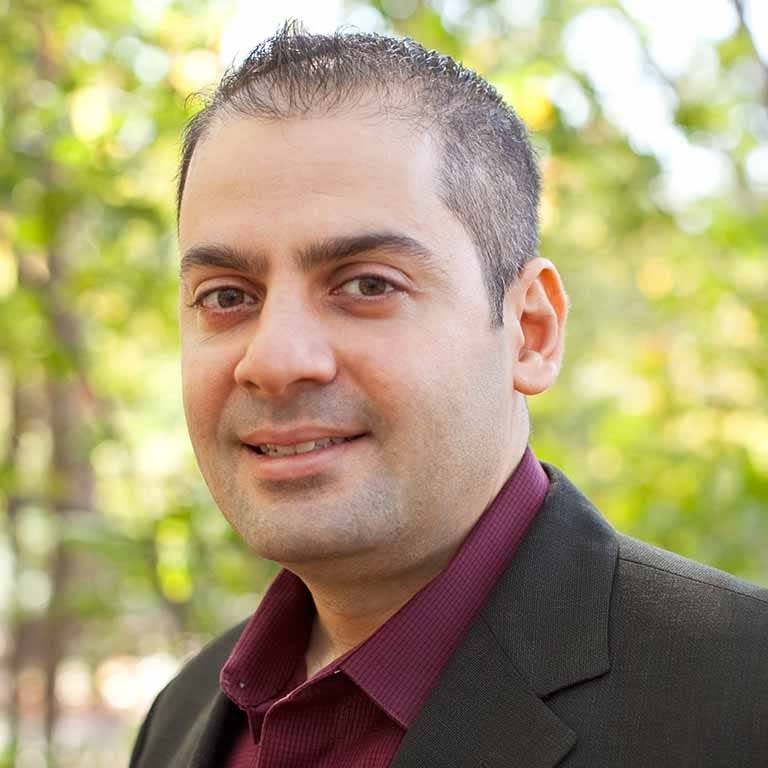'A new McCarthyism': Students, faculty worried about pro-Palestine censorship at IU
- Oops!Something went wrong.Please try again later.
- Oops!Something went wrong.Please try again later.
Students and faculty are worried instances of the Indiana University administration allegedly targeting pro-Palestinian speech in recent months will chill free speech and academic freedom on campus.
Jeffrey Isaac, an IU political science professor, warned Tuesday of a “new McCarthyism” entrenching IU and the country. Isaac was a speaker on a panel on free speech law and censorship hosted by IU’s American Constitution Society (ACS) chapter.
“It is unprecedented in my lifetime, and I’m 66 years old,” Isaac said.
Isaac has been an outspoken critic of the IU administration, which recently suspended political science professor Abdulkader Sinno and canceled Palestinian-born IU alumna Samia Halaby’s planned exhibition at the Eskenazi Museum of Art. Isaac has argued the actions feed into a trend of censoring pro-Palestinian advocates on campus. In a column submitted to The Herald-Times, Isaac drew connections between these decisions and a November letter from Rep. Jim Banks asking President Pamela Whitten to respond “aggressively” to reports of antisemitism at IU.
Isaac is not alone. Since the onset of the Israel-Hamas conflict, faculty and pro-Palestinian student advocates on campus have alleged IU has been targeting pro-Palestinian speech – and they worry it will set a precedent.
Sinno's suspension erodes trust between administration and Palestinian Solidarity Committee
In December, IU's vice provost suspended professor Abdulkader Sinno, faculty advisor to the Palestinian Solidarity Committee (PSC), for failing to follow proper protocols when registering a room for a PSC speaker event. Bryce Greene, the PSC's graduate student advisor and founder, said Sinno and the group were held to a stricter standard.
“I personally can’t imagine any other organization that would have an issue, even if they had filled out paperwork incorrectly or used a room that the university didn’t want to be used,” Greene said. “That was one example in which we saw that university is predisposed to make harsh sanctions against people who step out of line and support pro-Palestinian activism.”
On Tuesday, Isaac said he believes Sinno was suspended as an example to the PSC and other pro-Palestinian activists.
“The university has said to all of them, ‘You better watch out what you do and say,’” Isaac said. “And that is unjust.”
Vice Provost Carrie Docherty cited Sinno’s failure to request security measures for the PSC event as part of the reason for his suspension. But Greene said in the months since Sinno’s suspension, the university has not provided additional security and safety resources to the group.
“That seems to confirm that the intended effect was punishment, was disruption, and there is a natural chilling effect that comes from people being worried about their jobs and professional lives,” Greene said. “And that is the climate they’ve created.”

Sinno said he worries the actions could erode trust between the administration and IU students and faculty.
“There are more and more protests on campus in response to the university canceling the art of Halaby, and the case of my suspension,” Sinno said. “The different segments of the university are beginning to see that (the decisions are) not in the best interests of everyone in our community.”
Samia Halaby's exhibit cancellation raises questions about viewpoint discrimination
Indiana University galvanized both the campus community and the larger art world when it canceled the first American retrospective of Palestinian-born IU alumna Samia Halaby, which was set to open at the Eskenazi this spring. Halaby, an abstract artist whose work deals with themes of Palestinian displacement, was informed Dec. 20 by the museum’s director David Brenneman that the museum would no longer be hosting her work.
A university spokesperson said, "Academic leaders and campus officials canceled the exhibit due to concerns about guaranteeing the security of the exhibit for its duration," but critics have disputed this claim.
On Jan. 19, the Foundation for Individual Rights and Expression (FIRE), a freedom of speech civil liberties group, sent a letter to President Whitten expressing concern about the exhibit cancellation. The letter urged Whitten to remember IU’s obligations as a public university to refrain from viewpoint discrimination, an unconstitutional form of speech regulation against "speakers who express views on disfavored subjects."
Graham Piro, a program officer for FIRE who authored the letter, said while concerns of violence can be a valid grounds for regulating speech, IU’s failure to provide any evidence of the alleged safety concerns for Halaby’s exhibit cast doubt on the administration’s argument.
“If there are genuine concerns, the university has to show that,” Piro said. “They have to demonstrate, publicly, that there were concerns, and also demonstrate why the university couldn’t have addressed those concerns. Indiana (University) basically has to show its work.”
Steve Sanders, a constitutional law professor at IU’s Maurer School of Law, said if there were security concerns surrounding Halaby's exhibit, the university should first attempt to hold the exhibition safely.
“I think the fact that it doesn't appear that any alternatives were explored leads people to believe that that excuse is just a pretext,” Sanders said.
Sanders said he worries IU’s cancellation of Halaby’s exhibition and Sinno’s suspension set a dangerous precedent for academic freedom on campus.
“None of us can predict what the next incident is going to be, but we’ve had two things right on the heels of one another,” Sander said. “The first time you do something, a precedent is set.”
Reach Brian Rosenzweig at brian@heraldt.com.
This article originally appeared on The Herald-Times: Indiana University administration criticized for Halaby, Sinno decisions

